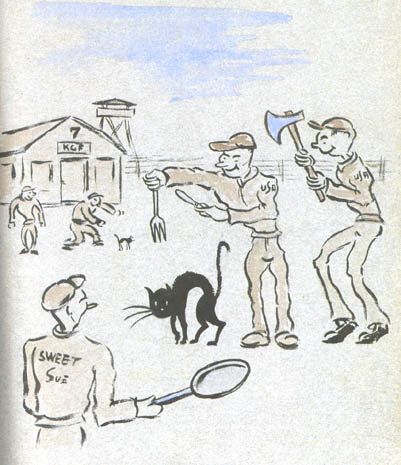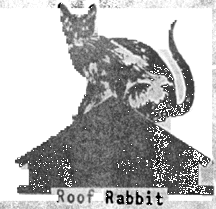|

Wherever you are, Good Buddy, Bill White’s got a confession.
He ate your cat about 56 years ago!
It was during what U.S. Prisoners of War in Germany’s Stalag Luft I called
‘Hungry March’.
One of the POWs was a fellow from
Arkansas. Every time he saw you, he’d say: “Hi, good buddy.” So it was
natural that he came by the nickname ‘Good Buddy’. His gray cat was also
called ‘Good Buddy’.
“Well, March 1945 was special. Even
the German guards were hungry” recalls William M. White, bombardier graduate
of Childress class 43-10 (15 Jul 1943). Bill as his B-17 crewmates knew
him, had been on his sixth mission with the 508th squadron of the
351st Bomb Group in “Piccadilly Commando”, a B-17F Flying
Fortress when flak and fighters forced their crew to ditch in the north English
Channel waters. Their entire crew was captured and interned by the
Germans. The officers went to Stalag Luft I, “on the snowy German Baltic
coast near Barth.”
White continued his comments. “Pet
cats began disappearing inside the camp. In those Gotterdammerung days of
the Third Reich, German civilians also ate cats. They called them “roof
rabbits.”
One particularly hungry day, 1st
Lt. Richard W. “Dick” Speers, navigator of the ill-fated B-17 crew, entered
the barracks room, opened his jacket and Good Buddy hopped gingerly to the
floor.
“Good eats,” said Speers.
A flyer, identity not remembered, but
who was a butcher before the war, “wapped the cat on the head. Another wap.
The cat sprang like a helicopter and zoomed around the room,” said White.
The starving prisoners caught,
dispatched, skinned and boiled Good Buddy for hours.
“We deboned the cat; mixed in some
powdered milk saved from a Red Cross parcel; and, My it was tasty,” said
White.
Bill was a prisoner from New Year’s Eve
1943 until May 1945. During this time his weight dropped from 170 to 126
pounds.
“The kid from Arkansas kept coming
around ‘Anyone seen my pet?’ Hi, good buddy, you seen my cat?’ No one had
the heart to tell him…Till now,” says Bill White.
The ‘now’ referred to occurred recently
when Bill White received a package from Guernsey, a 25 square-mile isle in
the English channel, off whose shores White’s aircraft was ditched.
The package contained the metal
bombardier’s instrument panel from the nose of ‘Piccadilly Commando’ and a
50-caliber bullet – all retrieved by Guernsey scuba divers who had located
and made several salvaging descents to the watery grave of the rugged
Fortress.
The scuba divers doggedly sought to
learn the names and locations of any survivors of “Piccadilly Commando”
(G.I. for London hooker). Their patience and perseverance paid off after
some two years of research!
White “reckons now all can be told.
Even a confession to Good Buddy.”
He concluded, ‘My wife, Mary Jane, and
I got a cat. Named it Morris. Morris loved Mary Jane, but that cat
wouldn’t come near me! Don’t know why. I never called it Good Buddy!”

Article from the September 1990 magazine "Crosshairs"
From the Editor – It is
hoped that no cat lover is offended. Hungry people will eat almost anything
to stay alive. |
